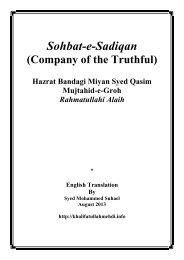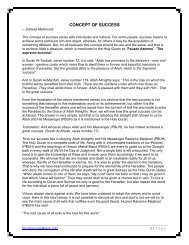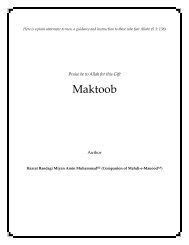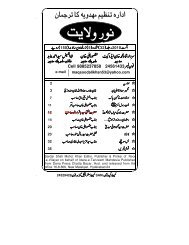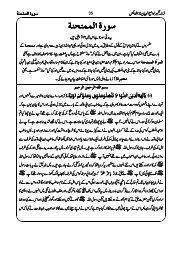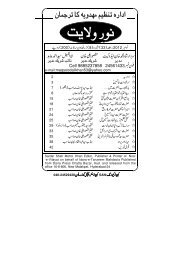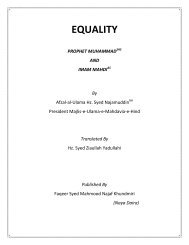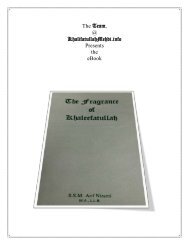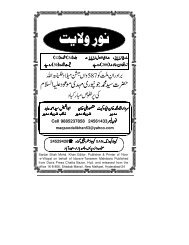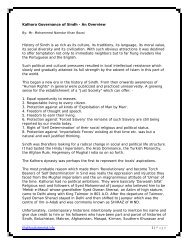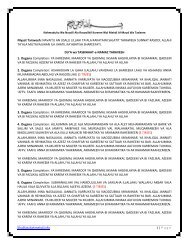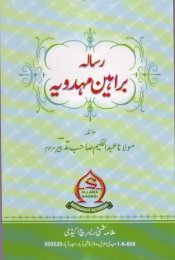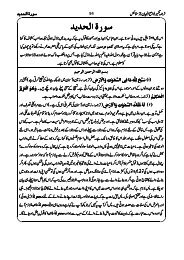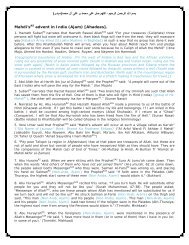Siraj-ul-Absar (English) - Khalifatullah Mehdi (AHS)
Siraj-ul-Absar (English) - Khalifatullah Mehdi (AHS)
Siraj-ul-Absar (English) - Khalifatullah Mehdi (AHS)
You also want an ePaper? Increase the reach of your titles
YUMPU automatically turns print PDFs into web optimized ePapers that Google loves.
30<br />
The meaning of Bid’at<br />
He [Muttaqi] says: When the matter pertaining to the bid’at [innovation] of these people is<br />
under discussion, I felt it appropriate to explain the meaning and kinds of bid’at, so that it<br />
becomes known what kind of bid’at these people [the Mahdavis] ind<strong>ul</strong>ge in. In shari’at, all<br />
those things which were not present during the period of the Messenger of Allah SLM and were<br />
introduced later are termed as bid’at. They are of two kinds: hasana [good] and qabiha [bad].<br />
Hence, Sheikh Imam, whose imamate is universally accepted and whose title is S<strong>ul</strong>tan-al-<br />
Ulama Abu Muhammad Abd<strong>ul</strong> Aziz bin Abdus Salam has written at the end of his book,<br />
Qavaid-al-Aqaid, that the kinds of bid’at are: Wajibat [obligation], muharramat [forbidden],<br />
mandubat [recommended] and makroohat [disapproved things though not unlawf<strong>ul</strong>] and<br />
mubahat [permissible].<br />
And he has given the procedure for segregating as follows: The bid’at sho<strong>ul</strong>d be juxtaposed<br />
with Shari'at laws; if it falls under the r<strong>ul</strong>es of wajoob [obligation], it is wajibah [obligatory].<br />
If it falls under the r<strong>ul</strong>es of tahrim [forbidden], it is muhramah [forbidden]. If it comes under<br />
the r<strong>ul</strong>es of mandubat [recommended], it is mandoobah [recommended]. If it comes under<br />
the r<strong>ul</strong>es of makroohah, it is makroohah [disapproved but not unlawf<strong>ul</strong>]. And finally, if it<br />
comes under the r<strong>ul</strong>es of mubah [permissible], it is mubahah [permissible].<br />
There are many examples of the bid’at-e-wajibah [obligatory]. One among them is the<br />
learning of the science of nah’v [syntax]. This is obligatory because the protection of Shari'at<br />
is obligatory; and this protects Shari'at. And the thing that helps complete the obligation, it is<br />
obligatory. And among them are the ghara’ib [rarities] of the Quran and the Sunnat. It also<br />
includes the compilation of the principles of Fiqh; criticism and cross-checking and the<br />
issues of the correct performance of various actions in ritual prayers; the discussion of the<br />
sahih [correct] and saqim [fa<strong>ul</strong>ty]. Further, the r<strong>ul</strong>es of the Shari’at prove that the protections<br />
in matters that exceed the fixed things in Shari'at are a farz-e-kifayah. 18<br />
There are many examples of the bid’at-e-muhramah [forbidden]. Among them are the<br />
religions or the schools of thought of the Qadriyah, Jabriyah, Marjiyah and Mujassimah<br />
sects. To contradict the religions of these sects is bid’at-e-wajibah [obligatory].<br />
There are many examples of the bid’at-e-mandoobah [recommended], like the construction<br />
of the caravan, serai and schools. In the earlier times these things were not seen as being<br />
constructed. And among the many bid’aat-e-mandoobah are the performance of the taravih<br />
[special night prayers in the month of Ramazan] and discussing the minute details of the<br />
tasawwuf [mysticism] and talking about the jadal [contentions and fighting], etc. Among<br />
them are also the issues of convening the Majalis-e-Mujadilah [congregations for arguing<br />
various issues], provided the objective of these congregations is to invoke the pleasure of<br />
Allah Most High.<br />
The examples of Bid’at-e-Makroohah are the decoration of the mosques, beautification of the<br />
Holy Quran, and others.<br />
Some of the examples of the bid’at-e-Mubahah are the shaking of hands by the musallis<br />
[performers of daily ritual prayers] after the pre-dawn and Asr prayers, eating of tasty meals,<br />
drinking of beverages, wearing of good dresses and residences, wrapping shawls and chadors<br />
and garments with loose sleeves, etc. Some of the <strong>ul</strong>ama have disapproved some of these<br />
things that they are the bidaat-e-makroohah. Some others hold that these are the Sunnats that<br />
18 Farz-e-Kifayah is a general obligation, whose performance by an adequate number absolves all; adequate<br />
obligation.



